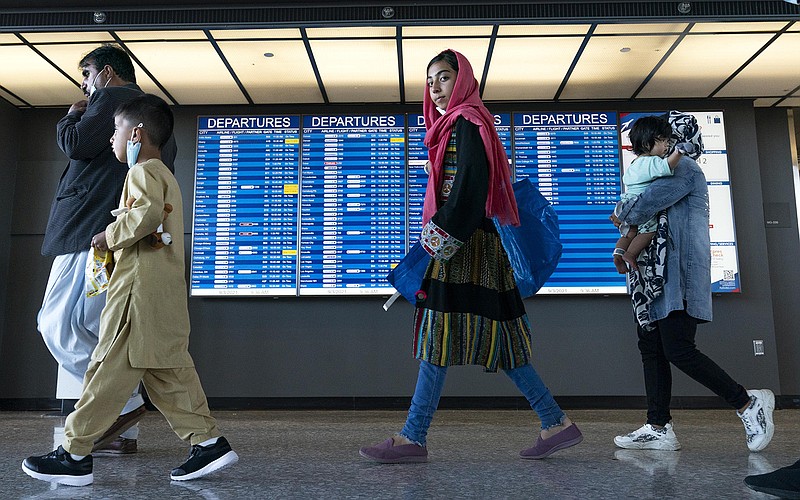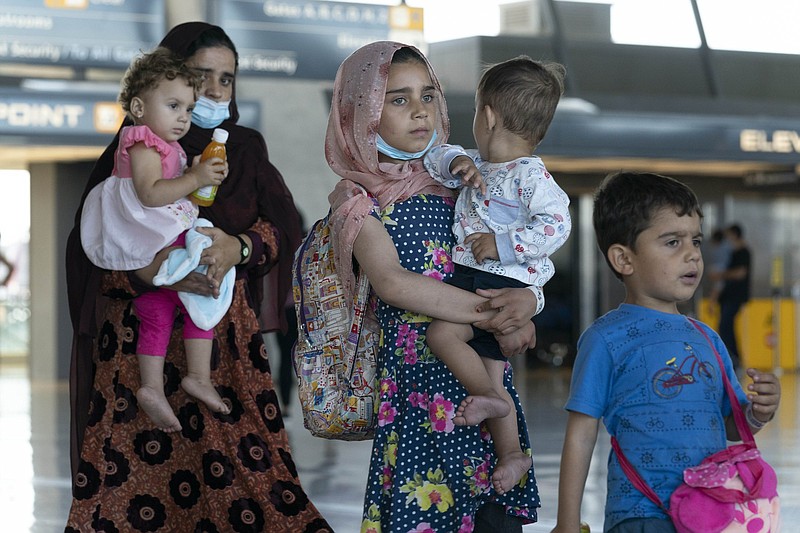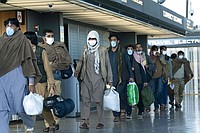WASHINGTON -- At least 50,000 Afghans are expected to be admitted into the United States as part of an "enduring commitment" to help people who aided the American war effort and others who are particularly vulnerable under Taliban rule, the secretary of the Department of Homeland Security said Friday.
Tens of thousands of Afghans already have made it through security vetting and arrived in the U.S. to begin the process of resettlement. Exactly how many more will come and how long it will take remain open questions, Homeland Security Secretary Alejandro Mayorkas said as he outlined the effort.
"Our commitment is an enduring one," he said. "This is not just a matter of the next several weeks. We will not rest until we have accomplished the ultimate goal."
[Video not showing up above? Click here to watch » arkansasonline.com/94blinken/]
Jack Markell, former governor of Delaware, will serve as coordinator of what the White House is calling Operation Allies Welcome. He will work alongside the National Security Council, Domestic Policy Council, Homeland Security and other federal agencies "to ensure vulnerable Afghans who pass screening and vetting reviews are safely and efficiently resettled here in the United States," said Karine Jean-Pierre, the White House principal deputy press secretary.
Nearly 130,000 people were airlifted out of Afghanistan in one of the largest evacuations in U.S. history. Many are still in transit, undergoing security vetting and screening in other countries, including Germany, Spain, Kuwait and Qatar.
Mayorkas said some evacuees have been stopped at transit points because of "derogatory information," though he provided no details. It is unclear what happens to any Afghans who don't make it through the security screening, though the secretary said the U.S. is working with its allies to address the issue.
[Video not showing up above? Click here to watch » arkansasonline.com/94mayorkas/]
More than 40,000 have arrived in the U.S. so far. Mayorkas said about 20% are either U.S. citizens or permanent residents. The rest are people who have received or are in the process of getting what's known as a Special Immigrant Visa -- for those who worked for the American military or NATO as interpreters or in some other capacity -- and Afghans considered particularly vulnerable under Taliban rule, such as journalists and employees of nongovernmental organizations.
"We have a moral imperative to protect them, to support those who have supported this nation," said Mayorkas, who as a child came to the U.S. as a refugee from Cuba with his family.
WOMEN RALLY IN KABUL
In Kabul, meanwhile, a small group of Afghan women protested near the presidential palace Friday, demanding equal rights from the Taliban as Afghanistan's new rulers work on forming a government and seeking international recognition.
[Video not showing up above? Click here to watch » arkansasonline.com/94women/]
The Taliban have promised an inclusive government and a more moderate form of Islamic rule than when they ruled the country from 1996 to 2001. But many Afghans, especially women, are deeply skeptical and fear a rollback of rights gained over the past two decades.
The women's protest in Kabul was the second in as many days, with the other in the western city of Herat. About 20 women with microphones gathered under the watchful eyes of Taliban gunmen, who allowed the demonstration to proceed.
The women demanded access to education, the right to return to work and a role in governing the country. "Freedom is our motto. It makes us proud," said one of their signs.
"We are concerned about the issues of human rights in Afghanistan, notably on the rights of women," U.N. spokesman Stephane Dujarric said Friday. "It is imperative that women have the right to work, to work in a safe environment, and those are some of the issues that have been brought to the attention of our interlocutors in Kabul and elsewhere."
[Gallery not loading above? Click here for more photos » arkansasonline.com/94afghans/]
The Taliban have said women will be able to continue their education and work outside the home. But they also have vowed to impose Shariah, or Islamic law, without providing specifics.
Interpretations of Islamic law vary widely across the Muslim world, with more moderate strains predominating. The Taliban's earlier rule was shaped by Afghanistan's unique tribal traditions, under which women are not to be seen in public. Those customs endure, especially in the countryside.
Information for this article was contributed by Ben Fox, Ellen Knickmeyer, Lolita C. Baldor, Kathy Gannon, Tameem Akhgar and Edie Lederer of The Associated Press.


